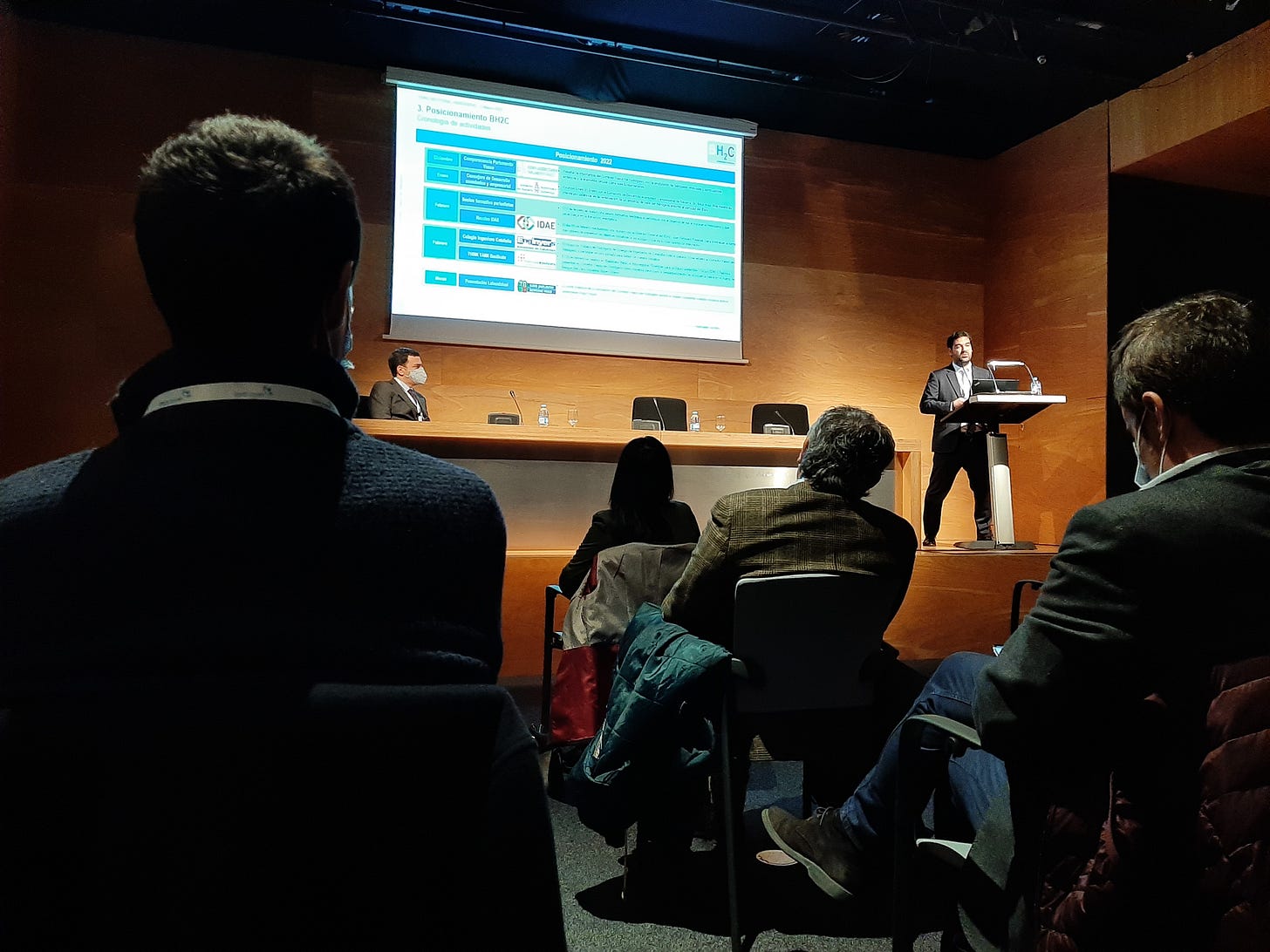12) Tercer encuentro del Foro Sectorial del Hidrógeno (FSH2)
Un placer poder acudir de manera presencial al Foro Sectorial del Hidrógeno que organiza el Cluster de Energía | Basque Energy Cluster del País Vasco.
Para quien no conozca el Foro Sectorial es el punto de encuentro del sector empresarial vasco en el ámbito de tecnologías del hidrógeno liderado por Petronor, S.A., quien está ayudando a dinamizar el sector facilitando el networking y el conocimiento mutuo de los asociados, así como de otras entidades activas en la economía del hidrógeno en Euskadi.
En el primer bloque de la jornada Petronor, S.A. ha detallado los últimos avances del Corredor Vasco del Hidrógeno (BH2C) remarcando que actualmente dentro de la asociación hay 40 proyectos en toda la cadena de valor. La junta directiva de la Asociación del Corredor Vasco del H₂ tendrá la ocasión de presentar las iniciativas ante el Lehendakari Iñigo Urkullu el 8 de Marzo.
En segundo lugar se han revisado el estado del PERTE de energías renovables , hidrógeno renovable y almacenamiento donde Alberto Diaz Echeverria de Deloitte ha resumido de una manera muy amena las bases reguladoras, es decir, las “reglas de juego” para canalizar el dinero hacia los programas concretos.
En este apartado se han descrito en primer lugar los requisitos para optar a las ayudas que se abrirán del 7 Marzo al 6 Mayo de 150M€ dentro “H2 Pioneros”. Así como, las subvenciones de 250M € dentro la “Cadena de valor del H2 renovable” del 8 Abril al 7 Junio.
En este punto me gustaría resaltar:
-Los costes de inversión subvencionable máximos será la diferencia entre el coste total de la producción del hidrogeno verde menos el coste de la actual tecnología de producción de hidrogeno (a día de hoy, el reformado de vapor de gas natural (SMR)).
El segundo bloque se ha centrado en la aplicación del hidrógeno en el sector de la movilidad con una visión global de FEV Consulting Iberia Sl., quien ha remarcado muy acertadamente que la clave para decantarse por una tecnología en el transporte por carretera es el Total Cost of Ownership (TCO) y para el nicho de mercado de larga distancia de 40 toneladas las previsiones del FCEV son mejores que la de los BEV.
Por su parte, Astilleros de MURUETA ha presentado el proyecto H2OCEAN donde se pretende diseñar, construir y poner en servicio un buque fluvial para transporte de personas, mercancías y ocio.
David De Bustos Ferrero de SEGULA Technologies ha hecho hincapié en la importancia de la seguridad para poder acceder al mercado con las certificaciones pertinentes dentro del sector ferroviario.
Finalmente AEG Power Solutions de la mano de Eduardo López de Armentia, SIDENOR mediante Asier Zubero y UPV/EHU con Gorka Artola Beobide han realizado unas presentaciones pitch para compartir su experiencia y capacidades en el ámbito del hidrógeno.
12) Third meeting of the Hydrogen Sector Forum (FSH2)
A pleasure to be able to attend in person the Hydrogen Sector Forum organized by the Energy Cluster | Basque Energy Cluster of the Basque Country.
For those who are not familiar with the Sector Forum, it is the meeting point for the Basque business sector in the field of hydrogen technologies, led by Petronor, S.A., who is helping to energize the sector by facilitating networking and mutual knowledge of associates, as well as other entities active in the hydrogen economy in the Basque Country.
In the first block of the day Petronor, S.A. has detailed the latest advances in the Basque Hydrogen Corridor (BH2C) noting that there are currently 40 projects within the association throughout the value chain. The board of directors of the H₂ Basque Corridor Association will have the opportunity to present the initiatives before the Lehendakari Iñigo Urkullu on March 8.
Secondly, the status of the PERTE for renewable energy, renewable hydrogen and storage has been reviewed, where Alberto Diaz Echeverria from Deloitte has summarized the regulatory bases in a very entertaining way, that is, the "rules of the game" to channel money towards the concrete programs.
In this section, the requirements to qualify for the aid that will open from March 7 to May 6 for €150M within “H2 Pioneros” have been described first. As well as, the €250M grants within the "Renewable H2 value chain" from April 8 to June 7.
At this point I would like to highlight:
-The maximum eligible investment costs will be the difference between the total cost of green hydrogen production minus the cost of the current hydrogen production technology (today, natural gas steam reforming (SMR)).
The second block has focused on the application of hydrogen in the mobility sector with a global vision of FEV Consulting Iberia Sl., who has rightly remarked that the key to opting for a technology in road transport is the Total Cost of Ownership (TCO) and for the 40-tonne long-haul market niche, the forecasts for FCEVs are better than those for BEVs.
For its part, Astilleros de MURUETA has presented the H2OCEAN project, which aims to design, build and put into service a river vessel for the transport of people, goods and leisure.
David De Bustos Ferrero from SEGULA Technologies has emphasized the importance of security in order to access the market with the relevant certifications within the railway sector.
Finally AEG Power Solutions by Eduardo López de Armentia, SIDENOR through Asier Zubero and UPV/EHU with Gorka Artola Beobide have made some pitch presentations to share their experience and capabilities in the field of hydrogen.






